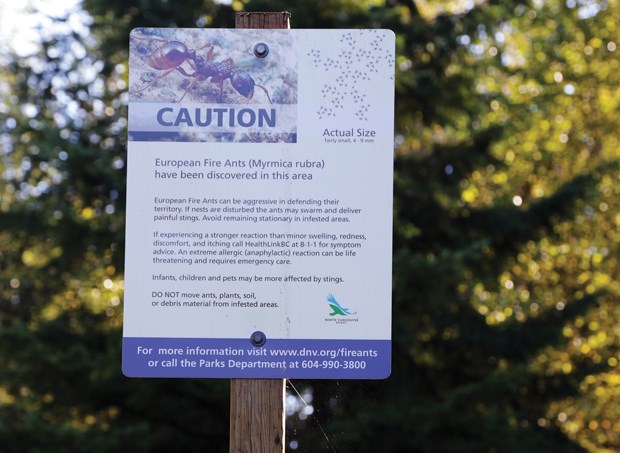A fiery insect intruder continues to invade parks and gardens on the North Shore but for now, the problem is not spreading.
European fire ants, an aggressive species of ant introduced to the Lower Mainland 10 to 15 years ago, is still making its home in North Vancouver properties and parks.
Rob Higgins, fire ant expert and professor of biological sciences at Thompson Rivers University, said the number of fire ants on the North Shore is not getting worse in the sense that he has not yet had any new colonies identified. "We know they're in Inter River Park, way down at Deep Cove and then we have a couple other locations in the District of North Vancouver, but so far that's the extent of it over there," said Higgins.
"The Inter River Park is fairly extensive in some areas, though, and it's a bit of a concern there."
Higgins said they do not have a way to control the ants.
"What I'm advising the district to do and what they've been doing for now is putting up some signage in the areas where (ants) are established to let people know so that they don't throw a blanket down on the ground right where we know there happens to be European fire ants," he said. Mapping of the areas in the district where colonies are known to exist was completed earlier this year. Higgins said the ants do not seem to have spread beyond where they were a couple of years ago. "We've also been trying to find out what the natural barriers are through their distribution," he said. In Deep Cove, for example, there are six unaffected properties in the middle of a "sea" of fire ants, he said, "so we're trying to figure out why haven't they moved onto those properties and what's been acting as a barrier to keep them off."
Higgins said there is a way to get rid of the ants but only if the area is very small. "If you've got them in a single raised garden bed, then it's the sort of thing that you might be able to deal with manually by digging them up, mixing them with boiling water, putting soil in the freezer, that sort of thing," he said. "But if they are spread through your city block, there is very little that you can do to control them." The ants do appear to retreat when they are constantly challenged, which can reduce colony numbers, said Higgins, who has observed that ants are generally found near edges of gardens. "One of the reasons I think is that it's not where people are constantly stepping," he said. "We have a sense that constant harassment of the ants will improve the situation on your property, but it is not a passive effort, it requires some real activity to achieve that." According to Higgins, the European fire ant is being moved and introduced into new areas through human activity
because we're moving them when we move soil, often with plants.
"So its important that if you're bringing soil or plants onto your property that they have no ants associated with them," said Higgins. "If you do see ant activity, they should go back to their source."
Once the ants are established, they take time to spread.
"You're not going to notice them this year and you won't notice them next year and possibly not even the third year, it's by the fourth or fifth year that suddenly they've built up enough nests that they're starting to really form high densities and sort of push out of that area of introduction," said Higgins. "And it's when you get those high densities that they really become quite aggressive. That's one of the challenges again with this ant is that it's introduced into new areas and will go unnoticed until there are too many of them to control."



